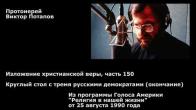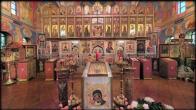ABOUT ORTHODOXY
You are here
The Parable of the Talents
In the times of the Gospel, a talent denoted a very large sum of money. A talent corresponded to sixty minas. A mina equaled a hundred dinarii. During the earthly life of the Saviour, an ordinary worker earned one dinarius a day.
We find the parable of the talents in the twenty-fifth chapter of the Gospel according to Matthew:
For the kingdom of heaven is as a man traveling into a far country, who called his own servants, and delivered unto them his goods. And unto one he gave five talents, to another two, and to another one; to every man according to his several ability; and straightway took his journey. Then he that had received the five talents went and traded with the same, and made them other five talents. And likewise he that had received two, he also gained other two. But he that had received one went and dug in the earth, and hid his lord's money. After a long time the lord of those servants cometh, and reckoneth with them. And so he that had received five talents came and brought other five talents, saying, Lord, thou deliveredst unto me five talents: behold, I have gained beside them five talents more. His lord said unto him, Well done, thou good and faithful servant: thou hast been faithful over a few things, I will make thee ruler over many things: enter thou into the joy of thy lord. He also that had received two talents came and said, Lord, thou deliveredst unto me two talents: behold, I have gained two other talents beside them. His lord said unto him, Well done, good and faithful servant; thou hast been faithful over a few things, I will make thee ruler over many things: enter thou into the joy of thy lord. Then he which had received the one talent came and said, Lord, I knew thee that thou art an hard man, reaping where thou hast not sown, and gathering where thou hast not strawed: and I was afraid, and went and hid thy talent in the earth: lo, there thou hast that is thine. His lord answered and said unto him, Thou wicked and slothful servant, thou knewest that I reap where I sowed not, and gather where I have not strawed: thou oughtest therefore to have put my money to the exchangers, and then at my coming I should have received mine own with usury. Take therefore the talent from him, and give it unto him which hath ten talents. For unto every one that hath shall be given, and he shall have abundantly: but from him that hath not shall be taken away even that which he hath. And cast ye the unprofitable servant into outer darkness: there shall be weeping and gnashing of teeth (Matthew 25:14-30).
In preparing to leave this world, Christ charged His disciples, both the twelve Apostles and the others, to continue His work and to see to their own personal salvation and the salvation of others. So that His followers could labor successfully, He gave them essential spiritual gifts - talents - to each according to his strength. As we saw in the parable of the minas, a man's spiritual strength is determined by how well he has learned to overcome his own will and do God's will. Whoever has acquired greater strength also receives greater gifts. In other words, the Lord distributes His gifts in conformity with the number of minas gained by a man. Then Christ left this world.
One must not think that all this concerns only the Apostles and the other immediate disciples of Christ. Even to this day, the Lord distributes His spiritual gifts to the successors of the Apostles - the pastors of the Church - and also, in general, to all Christians who believe in Him, who have a desire to serve Him, however small it may be.
The talents in the parable denote the totality of all the good things given by God to man. Material talents - these are wealth, favorable living conditions, social status and good health. Talents of the soul - these are a lucid mind, a good memory, various abilities in the arts and crafts, the gift of eloquence, courage, sensitivity, compassion and many other qualities which are placed in us by the Creator. There are also talents of the spirit. The Apostle Paul enumerates some of them in his First Epistle to the Corinthians: But the manifestation of the Spirit is given to every man to profit withal. For to one is given by the Spirit the word of wisdom; to another the word of knowledge by the same Spirit; to another faith by the same Spirit; to another the gifts of healing by the same Spirit; to another the working of miracles; to another prophecy; to another discerning of spirits; to another divers kinds of tongues; to another the interpretation of tongues (I Corinthians 12:7-10).
To this we shall add the gift of prayer, the gift of exhortation, the gift of just governance. There are many gifts - you cannot enumerate them all. The Lord gives all these gifts to His followers for their own use and for the benefit of others.
He who had received five talents went and used them in business and gained five other talents. In exactly the same way, he who had received two talents gained two others. One must increase the talents received. But how? Every natural ability, whether it be an aptitude for music or painting or some other ability, is increased by exercise. In exactly the same way, spiritual gifts - talents - are increased by exercise. Talents, after all, are also abilities. Having received some gifts from the Lord, we must use them in trading. Then they will grow uninterruptedly. One must only not remain inactive. Having received, for example, the gift of prayer, we must diligently pray for ourselves and for others; having received the gift of teaching, we must educate others, and so forth. The Apostle Paul writes: Having then gifts differing according to the grace that is given to us, whether prophecy, let us prophesy according to the proportion of faith; or ministry, let us wait on our ministering: or he that teacheth, on teaching; or he that exhorteth on exhortation; he that giveth, let him do it with simplicity; he that ruleth, with diligence; he that sheweth mercy, with cheerfulness (Romans 12:6-8). If we act according to the Apostle's counsel, we can be certain that our talents will increase. Thus did the faithful servants mentioned in the parable act.
But he who had received one talent went and buried it in the earth and hid his lord's silver. This servant hid his one talent, that is, he did not manifest the least desire to use it profitably. It is important to pay attention to the fact that this servant buried his talent in the earth. This means that he used the abilities given to him by God only for the better arrangement of his earthly, worldly affairs, and not for the benefit of his soul.
He who had received five talents, and he who had received two, showed identical zeal in working for the Lord, and that is why they also received equal praise. The Lord values diligence. This is evident also from the narrative about the widow who put only two mites into the temple treasury. In the Lord's eyes, these two mites proved to be more valuable then the large donations offered by the rich. Thou hast been faithful over a few things, I will make thee ruler over many things. The spiritual gifts which the servants receive in this world are paltry by comparison with those which they receive in the world beyond the grave.
Enter thou into the joy of thy lord - says the Lord to the faithful servants. God is the All-blessed Spirit, and that is why the unceasing joy which He has prepared for those who love Him is incomprehensible to man's understanding. As the Apostle Paul writes: Eye hath not seen, nor ear heard, neither have entered into the heart of man, the things which God hath prepared for them that love him.
For his negligent attitude toward spiritual matters, the third servant received only one talent. But he could have increased this talent also, had he wanted to do so. But he, on account of his laziness, remained inactive. Being wicked, he went so far as to accuse his lord of unjustness: …thou art an hard man, says the servant, reaping where thou hast not sown. Thou didst not given me sufficient gifts, and desirest of me that I myself succeed spiritually and look to the benefit of others. I was afraid to use thy money in trading so as not to lose it completely, and incur punishment for this from thee. I went and hid thy talent in the earth: lo, there thou hast that is thine. At least I have returned the money to thee intact. This servant even proudly boasted that he returned his talent to the lord intact. He seemingly does not notice that by insulting his lord, by calling him a cruel and avaricious man, he pronounces the sentence against himself. If the lord is cruel, then it was incumbent on him to make an even greater effort and to be fearful; if the lord demands what is another's, then all the more will he demand his own. And the lord pronounced his judgment on this lazy and impertinent servant: Take therefore the talent from him, and give it unto him which hath ten talents. For unto every one that hath shall be given, and he shall have abundantly: but from him that hath not shall be taken away even that which he hath. And cast ye the unprofitable servant into outer darkness: there shall be weeping and gnashing of teeth. As in the parable of the minas, grace is taken away from the negligent and given to him who brings the greatest fruits to God's Kingdom. The richer a man is in virtues and other spiritual gifts and talents, the greater benefit he brings to his neighbors.
The worthless servant was cast into outer darkness. Outer darkness is the state of a soul abiding outside of communion with God. God is light, and he who abides in God abides in light. He who is deprived of communion with God because his works are worthless to God is deprived of light and, naturally, is found to be in darkness (I John 1:5-7; 2:8-11). In order to avoid this outer darkness, one must, while there is time, increase one's talents.
The cross of one's life, those conditions which surround us in life are also a talent, are also something which we must make use of, which we must cause to multiply and increase. And no matter how difficult those conditions might be in which the life of a Christian passes, whatever dark clouds might gather over him, he always comes out a victor, if he is able to remain faithful to God until the end of his earthly sojourn, not in word only, but also in deed. And this means to continually increase the talents given us by God.
©V. Potapov
PARISH LIFE
RECENT VIDEOS
Address of our Cathedral
Subscribe to our mailing list
While all the materials on this site are copyrighted, you may use them freely as long as you treat them
with respect and provide attribution on the Russian Orthodox Cathedral of St.John the Baptist of Washington DC.









